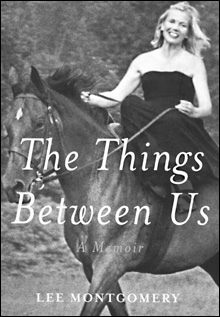
THE SYNOPSIS MAY BE GLOOMY: but Montgomery’s dad is one hot tomato.
|
Shortly after Lee Montgomery finds out her father has stomach cancer, she stands in a cornfield on a late fall day and wishes for time travel. She describes the beauty of the sky and the long grassy carriage way, the ponds, wooden bridges, woods, and trails. She cannot escape the desolation of the present, but in The Things Between Us, the simple grace of her prose evokes a long-ago time, way before it became fashionable for autobiography to devolve into lurid semi-truths and scandal. Her uncluttered style and her ability to evoke a pastoral atmosphere are closer to E.B. White than to Augusten Burroughs.
A synopsis could look a little gloomy: adult children return home to watch father die. But B.D. (“Big Dad,” from his pre-tumor fatty days) is one hot tomato, hooting and harrumphing and funny as hell, even after he finally understands he’s going to die. One day Montgomery watches him pushing around on his stomach. Her: “Dad, what are you doing?” Him: “Dying.” Her: “What?” Him: “Not a fucking thing.” He argues with a nurse who says he fell out of bed. (“Did not! I slid!”) He likes his women loud and vulgar — which helps explain his 60-year connection to Mumzy, one-time singer with Billie Holiday’s trumpet player and saver of emphysemic horses.
Who knew parts of Framingham remain so wide open and undeveloped? Montgomery grew up there but left for the West Coast 20 years ago, at least partly to get away from drama-queen drunk Mumzy. But she and her father remain close, having shared transcontinental confabs about their various house and garden projects. Now they’re together, along with Mumzy, brother (from the North End), and older sister (from San Diego), and everybody takes turns looking after B.D. in his last months of life.

|
Montgomery writes with tenderness and candor, shifting smoothly into memories of past years, of the things that have come to define B.D. — and herself — as people. There’s a tranquility in the weeks and months that she spends reacquainting herself with the woods and streams where she grew up. Early on, as she and her father do garden chores, she sets the rhythm. The panic of knowing that he’s dying is set against the serenity of her surroundings and the comfort of being near him. As the weeks pass, she begins to understand why B.D. has stayed with Mumzy in spite of the limits that placed on his life.
Like any story involving death, this one has its regrets: B.D. never went to Harvard, though he was accepted, and he never learned to fly. And his daughter thinks sadly of all the years she’s spent away from him. But mostly the book is about Montgomery’s wish to capture her father in words, to beat death through the lens of memory. She describes him in physical and psychological detail: “There is something about my father’s hands and feet. They endure. He loses hundreds of pounds — his body grows into only bones, his face melts into the unrecognizable expression of a tormented old man, but his fingers, those lovely stubs cut off at the ends, the rough, rosy palms of his hands that reach, mend, fiddle, worry, and repair, remain unchanged.”
ADVERTISEMENT
 |
The title refers to the obstacles that keep family members alone and apart but also the idiosyncratic ways in which family members pull together when confronted with the unthinkable. The Things Between Us is a beautiful tribute to a funny old guy who laughed loud and often, and whose daughter did the best she could to make him less lonely as he left the planet.
THE THINGS BETWEEN US: A MEMOIR | BY LEE MONTGOMERY | SIMON & SCHUSTER | 238 pp | $23
LEE MONTGOMERY reads at Porter Square Books, 25 White St, Cambridge | September 29, 7 pm | 617.491.2220